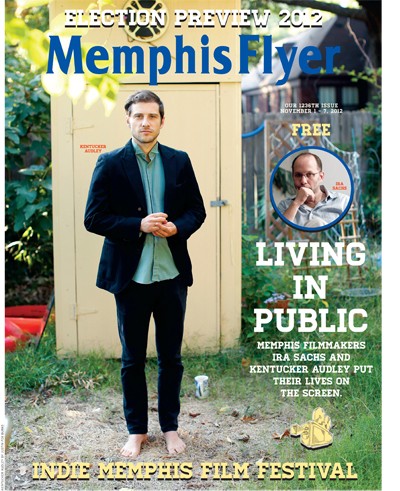Two years ago, a relatively unknown local filmmaker named Andrew Nenninger, who works under the pseudonym Kentucker Audley, won an award at Indie Memphis for his short film Bright Sunny South, a little black-and-white drama less notable for its somewhat contrived story and at times over-heated acting than for its moments of deadpan comedy and the timing and framing of a natural filmmaker.
Bright Sunny South went on to screen at the Slamdance Film Festival, which gave Audley entry to the filmmaking world outside of Memphis. Two years later, Audley’s Team Picture becomes perhaps the first debut feature from a local filmmaker to screen at Indie Memphis with more of a reputation outside Memphis than within it.
That the 25-year-old Audley already has become a filmmaker of note within certain indie-film circles might be surprising to some Team Picture viewers, who will see an ostensibly awkward no-budget film shot on a home-video-quality camcorder in which not much really happens.
Yet Audley was named one of the “25 New Faces of Independent Film” this summer by Filmmaker Magazine, and Team Picture has already screened at two series devoted to emerging filmmakers in New York and Boston, screening at the IFC Center in New York as part of a program called “The New Talkies” and at the Harvard Film Archive’s Independents Week in a series curated in part by film scholar Raymond Carney, a noted expert on the father of the American indie scene, John Cassavetes.
In his notes on Team Picture for the Harvard series, Carney offers an extremely perceptive and persuasive case on what makes Team Picture more than the lazy, listless first film some might mistake it as: “Audley’s Team Picture presents a view of experience close to the flatness and banality of off-screen life,” Carney writes. “Rather than being organized around dramatic conflicts, confrontations, and resolutions, Audley’s narrative consists of evasions, delays, and deferrals of dramatic significance. … These may sound like merely negative virtues, but Audley’s studious avoidance of rhetorical heightening reveals a complex world on the other side of the programmatic conflicts and patterned intensification of mainstream filmmaking.”
Team Picture focuses on a few days (or perhaps weeks) in the life of a young man named Dave (played by Audley under his given name), who is caught between his ostensibly normal work and family life and his more bohemian home life. At the outset, Dave shows up for work at a Germantown sporting goods store, looking uncomfortable in khaki pants and a tucked-in baby-blue polo shirt and exchanging awkward conversation with his boss, a jocky and jocular man (played by local sportscaster Greg Gaston) who also happens to be his mother’s boyfriend. Audley cuts from this scene to a shot of Dave at home and at ease — wearing cutoff shorts, a straw hat, and sunglasses, strumming an acoustic guitar and filling up a kiddie pool in the overgrown front yard of the Midtown house he shares with roommate Eric.
“I really like the idea of colliding identities,” Audley says, “pitting the character’s past [like Audley, Dave played a lot of organized sports as a child, which yields the film’s title] against his present and the fish out of water thing for him to be back in his parents’ house.”
There’s great, understated comedy in Team Picture. At one point, Dave attends an open mic at his neighborhood coffee shop, introducing himself to a handful of disinterested patrons like this: “I want to play a song I wrote today. It’s based on a decision I made, a life decision. It’s called ‘I’m Going to Quit My Job Tomorrow.’ It’s a true-life kind of thing.” And there’s also tenderness, as in his hapless courtship of a girl that inspires a side trip to shoot on location in Chicago.

Audley’s emerging reputation outside of Memphis — and his inclusion in the recent New York and Boston series — are a result, in large degree, of his being cited as part of a loose cohort of twentysomething filmmakers whose work has been dubbed “mumblecore.” Audley has befriended many of the leading filmmakers of this movement, including Andrew Bujalski, whose Mutual Appreciation has become the genre’s signature film.
“I hadn’t seen any of those films before I made Bright Sunny South, but I would say that Mutual Appreciation was an influence on Team Picture,” Audley says. “I had the script written by the time I saw that, but it influenced me in terms of keeping it small and relying on natural situations — trusting that that would be enough, not heightening anything or making it more dramatic than it would be in real life.”
A Kentucky native (thus his moniker), Audley moved to the Mid-South to finish school at the University of Memphis after a couple of years of film school at the Savannah College of Art & Design.
“I had a pang of guilt about spending my parents’ money on a very expensive education,” Audley says. “So I went home, saved up money, and came to college [at U of M].” In Memphis, Audley fell into the nascent filmmaking scene surrounding Midtown’s Memphis Digital Arts Cooperative, which also gave birth to local filmmaker Morgan Jon Fox and his debut Blue Citrus Hearts, another local feature that was shown widely on the festival circuit.
Team Picture, Audley says, is somewhat biographical.
“I feel like it’s me a few years ago. I’m 25 — I think the character is about 21. It definitely is my personality in the movie, focusing on one aspect of my personality.”
That personality may separate it from Audley’s mumblecore contemporaries, whose films tend to be more talkative than Audley’s comparatively non-verbal work.
“I think that a lot of the mumblecore movies are very chatty and that’s one of the things that makes Team Picture a little different,” Audley says. “It’s setting up a mood more than it is talking about anything.”
In trying to make movies that bypass filmmaking conventions to capture something real, Audley might be helped by something that definitely separates him from most other aspiring filmmakers: He’s not very influenced by other peoples’ films.
“I don’t watch a lot of movies, in general,” Audley says. “The idea is to be influenced primarily by real life. Most films do seem to be influenced by other films rather than by real life, and that’s a shame to me.”

